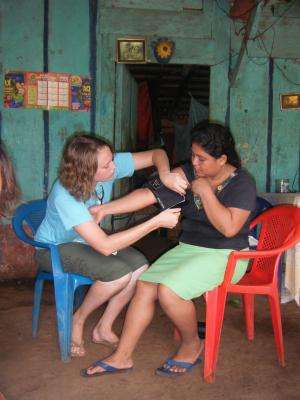Cleaner burning cookstoves improving health in developing world, study finds

(Medical Xpress)—Older women in the developing world are likely to see direct health benefits such as reductions in blood pressure in a relatively short amount of time once they switch to cleaner burning cookstoves, according to a study by Colorado State University environmental researchers.
Jennifer Peel, a professor of Epidemiology in Environmental and Radiological Health Sciences, and Maggie Clark, a research scientist, conducted a study in Nicaragua, measuring indoor air pollution exposures and health of women while they used traditional open fires in their homes and also one year after installation of cleaner burning stoves.
Results appear this fall in an online edition of Indoor Air, a peer-reviewed scholarly journal.
"We know from the ambient air pollution literature that some people are more susceptible to adverse health effects of air pollution exposures," Clark said. "We wanted to know if that meant that certain subgroups might be more likely to benefit from reducing those air pollution exposures. Are some people more likely to see health benefits as compared to the rest of the population?"
The scientists have theorized that older and obese populations as well as those with lower economic status might be more likely to benefit. The project started in 2008 with 125 families in El Fortin, a poor neighborhood outside of Granada, Nicaragua, to evaluate the potential health impacts of the improved stoves, supplied by the nonprofit organization Trees, Water & People and manufactured in Managua, Nicaragua.
Results from the study show that older women had greater reductions in blood pressure after the stove was introduced as compared to younger women – and some suggestion that the obese population saw greater improvements in blood pressure than women with normal weight, they said.
"The biggest limitation is that only 50 percent of the women we studied completely adopted the new stove – for various reasons, many of the women are still using their old open fire, often right alongside the new stove," Clark said. "However, we were able to see benefits even though we didn't see complete sustained adoption of the improved stove. That leads to the question, what level of health improvements might we achieve if the stoves are completely and sustainably adopted?"
Added Peel, "Cleaner burning stoves have the potential to have a huge impact on global public health. We need to find a solution that will reduce exposures but also one that meets the families' needs.
"We really don't know how clean is clean enough. How clean does a stove have to be in order to see substantial health improvements?"


















